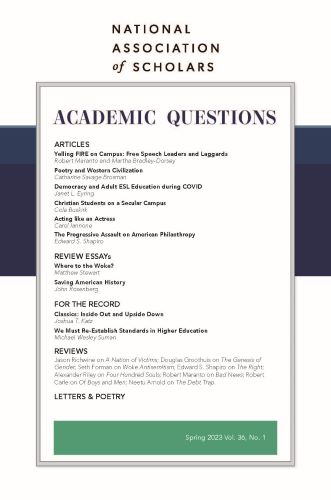Carol Iannone is editor-at-large of Academic Questions, 420 Madison Ave., 7th Floor, New York, N.Y. 10017; [email protected].
I recently read an article noting some of humanity’s achievements in the past and remarking how many more achievements there would have been if women had been freer to follow pursuits beyond the home. The general idea is not unfamiliar but I’d never heard it put so directly, which must be why for the first time something occurred to me. Many of the women of the past, and the men too, would not even have been born if women had been as job-and-career oriented as they are now in prosperous countries. Anyone who was a third, fourth, fifth, sixth, and so on child (Bach was the youngest of eight) might not have existed in a time like ours when even well-off and happily married women can manage only one or two children at most and in the main. A combination of feminists denigrating home and family while pushing jobs and careers, forecasters predicting doomsday about overpopulation, environmentalists warning about the special costliness of children to Mother Earth in the West with their huge consumer habits, convinced many well-meaning couples that they must confine themselves to one or two offspring at most. Have you ever heard the expression, one and done, and kind of shivered that there should even be such an expression with reference to human propagation?
This led me to ask what exactly is the ground zero of contemporary progressive thought; what’s the thought behind all that thought? I say “contemporary” because, as has been noted, the old progressives and Marxists at least valued competence, ability, effort, talent, merit, genius, whereas the contemporary progressive disdains those things, terming them hallmarks of oppression and “white supremacy.” Affirmative action has led to the lowering of standards, at first to admit minorities and women but over time across the board, as the great works of the Western tradition were attacked and denigrated; standardized tests are being eliminated at many colleges and universities; reason, rationality, and belief in truth are disdained as instruments of white supremacy; and diversity as group representation has replaced true qualification for the job, the task, the position, the promotion, the sculpture, the monument.
As a result, we are moving closer and closer to the broad satire of the laugh-out-loud 2006 movie Idiocracy, set in the year 2505, when intelligence has declined to such a preposterous degree that the by-then greatly impoverished outlines of civilization—law, medicine, politics, commerce, agriculture—are still present, but have become, quite literally, a joke. To hear that the Princeton classics department has eliminated Latin and Greek as requirements for classics majors is something that might have been part of a satirical campus novel some decades ago by, say, Thomas Pynchon or John Barth or Philip Roth, but is now our reality. The notion that you would demand medical doctors be chosen for group representation rather than ability and expertise could likewise be a feature in a futuristic dystopian novel.
As noted above, nowadays, the mandate that reality reflect current identity group thinking is applied not only to the present, but also to the past. The Judeo-Christian model of civilization as linear, capable of being seen as progressive in the old sense, with accumulation of knowledge and greater achievements unfolding over time, even as man must grapple with his sinful nature and its frequent deadly outbursts, does not appeal to current activists. Neither does the more circular model of the Greeks, the rise and fall of fortunes due to the tragic limitation of human existence itself. In fact, in another of those parodic campus developments, some British universities are putting “trigger warnings” on Greek and Shakespearean tragedy altogether, lest the delicate snowflakes, aka students, be taken by surprise and become alarmed at the dark visions contained therein. The ancient works, both Greek and Judeo-Christian, miraculously preserved and handed down with great difficulty through many generations and historic upheavals, containing precious wisdom about our nature and our fate as human beings on planet Earth, are not to befuddle our young people any longer.
What then is the vision of human existence of the woke? It can be found in the title of this introduction, in the verbal tense called the past conditional—would have been, might have been, and above all, should have been. Since humanity is believed to have arrived at the ultimate in enlightenment in the woke premises of today, all of the past must be judged as having failed in achieving this state of luminosity. No great credit can be accorded to the movement for abolition, for example, since slavery should not have existed in the first place. Women getting the vote was no great thing, since they should have had it from the beginning and everything should have been fifty-fifty from the dawn of time, or before. When the U.S. finally does get a woman president, one of the first responses will be, it should have happened years ago. Indeed, the reason behind Biden’s push for “equity,” proportional representation by group, together with the diminishment of white people, especially white men, is that they should never have had the privileges they supposedly have had. And as a logical corollary of all this, the purportedly “marginalized” and “underserved” groups are now owed big time collective reparations, to bring them to the point where they should have been all through history. In fact, the goal of many progressives reaches even further than that. When Ruth Bader Ginsburg was asked when there would be enough women on the Supreme Court, she answered, “When there are nine.” Another lesser known progressive opinionator declared that we will not have achieved equality between the sexes until we have had 45 female presidents, the going number at his writing.
It’s a type of spiritual gluttony. Once progressives discovered their supposed “marginalization,” or that of the others whom they would champion, they withdrew from participation in the march of humanity and their own participation in ordinary, everyday history, to stand like a theoretical Archimedes on a point in outer space, seeking to move the planet with the lever of victimhood and demanding a retroactive fulfillment of their hunger and greed, whether for themselves or the others.
In a more sympathetic vein, Thomas Carlyle writes of this phenomenon of gross entitlement in Sartor Resartus. It is, quite simply, man’s nature to desire the infinite, he says, nothing less than all. “Man's Unhappiness,” he writes, “comes of his Greatness; it is because there is an Infinite in him, which with all his cunning he cannot quite bury under the Finite.” He demands nothing less than “God's infinite Universe altogether to himself, therein to enjoy infinitely, and fill every wish as fast as it rose.”
This understanding brings Carlyle to an experience of comity with his fellows, to a feeling of Love and Pity for their sick souls miserable with unfulfilled longings, and he offers counsel in how to achieve greater contentment.
Can this understanding make us feel sympathetic to contemporary progressives, likewise miserable with unfulfilled longings, but in their case also destroying everything good as they try to fulfill them through an unreal and spurious vision of human equality? Perhaps.
Carlyle’s answer to what he has correctly diagnosed of the human condition, comes down to the need for . . . humility, lowering expectations, and a little math: “So true is it . . . that the Fraction of Life can be increased in value not so much by increasing your Numerator as by lessening your Denominator.” If you have 6/12 as your fraction, you seem to have only one half of what you need, but if you reduce the denominator to 3, you would have twice as much!
Another of Carlyle’s remedies is to “close thy Byron, open thy Goethe,” which might seem meaningless to those who have canceled out all white males, but its meaning does persist. That is, close the book on Byron—whiny self-pity, self-indulgence, and self-entitlement, and open it on Goethe—spirited self-forgetful aspiration after what is truly good.
The authors in this issue do that automatically, are firmly situated on planet Earth and write as active participants in the human condition and as grateful, watchful partakers of the great tradition in commonality with their fellow beings.
—In “Yelling FIRE on Campus: Free Speech Leaders and Laggards,” Robert Maranto and Martha Bradley-Dorsey give a brief history of the idea of free speech in America and analyze some revealing data about the more free and less free campuses today.
—In “Poetry and Western Civilization,” poet Catharine Savage Brosman explains the importance of poetry through the ages and in our time.
—Janet L. Eyring considers the practical connections between teaching English as a Second Language and introducing recent immigrants to the meaning of American citizenship, in “Democracy and Adult ESL Education during COVID.”
—Something you don’t hear often—Christianity is thriving among college students, as recent Stanford grad Cola Buskirk found and relates in “Christian Students on a Secular Campus.”
—How do actresses feel about what they are expected to say and do in the increasingly coarse and explicit movie world of today? See my article, “Acting like an Actress.”
—In “The Progressive Assault on American Philanthropy,” Edward S. Shapiro discusses the varied responses to a recent book attacking private endowments.
—Matthew Stewart examines three books in a review essay, "Where to the Woke?” and assesses their varying degrees of awakeness.
—In “Beyond Bakke,” a second review essay assessing the import of three new books, John S. Rosenberg explains that the Constitution is colorblind and that the Fourteenth Amendment actually means what it says.
—Joshua T. Katz considers the state of his discipline in this talk which we print in For the Record, “Classics: Inside Out and Upside Down.”
—In a second For the Record, “We Must Re-Establish Standards in Higher Education,” Michael Wesley Suman offered his honest view of the state of the General Education curriculum at UCLA in response to the Academic Senate Program Review process there.













